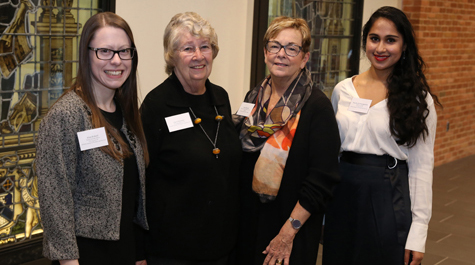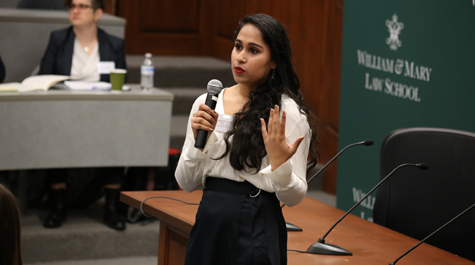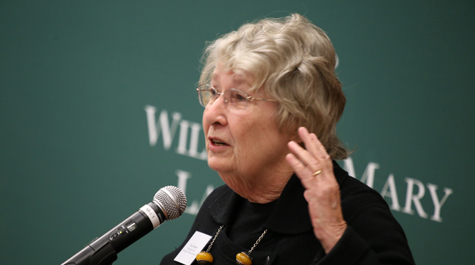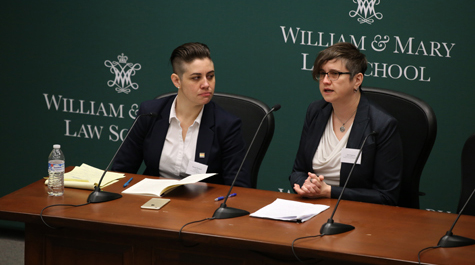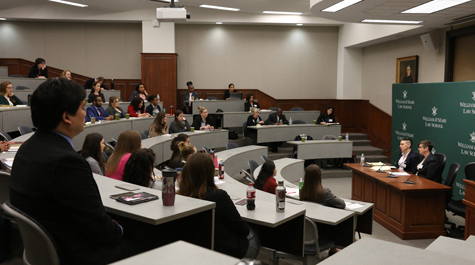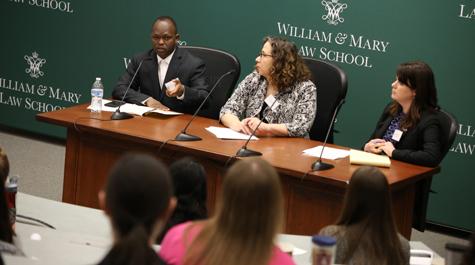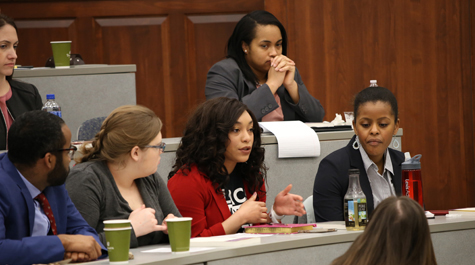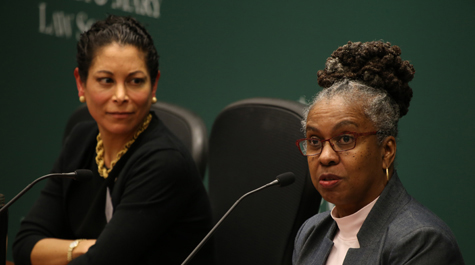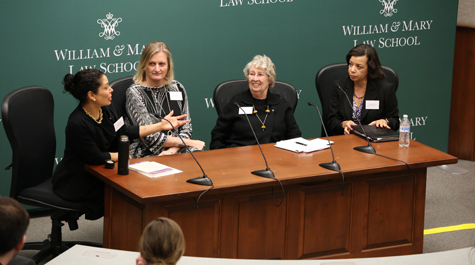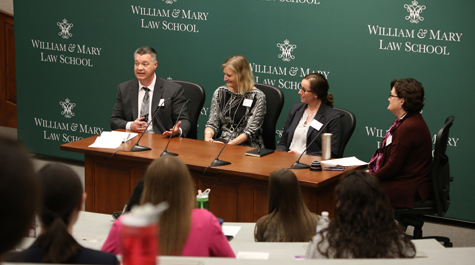Journal of Women and the Law’s Annual Symposium Highlights Women and Law Enforcement
William & Mary Law School’s Journal of Women and the Law (JoWL) held its annual symposium, “Enhancing Women’s Effect on Law Enforcement in the Age of Police and Protest,” on February 9, 2018.
Expanding on the Journal’s annual Special Issue, symposium topics included: Transgender Women and Law Enforcement, Police Violence against Black Women, and Representation of Women in Law, among others.
“We’re very lucky that most of the authors who wrote for the special issue are here to talk about their scholarship, get into the issues, and answer a lot of questions,” said JoWL Editor-in-Chief Renuka Santhanagopalan J.D. ’18 during opening remarks. “We’re also lucky to have legal experts and law enforcement personnel to add to the discussion.”
Santhanagopalan promised that the symposium topics would be both timely and unique.
“Over the last few years we’ve talked a lot about criminal justice reform and law enforcement; less talked about is how these issues affect women, particularly different types of women from different communities,” she said. “For instance, the issues affecting transgender women are different from those affecting black women, and both need to be talked about to effectively strategize any type of reform.”
Former JoWL advisor Jayne Barnard, James Cutler Professor of Law Emerita, introduced special guest and panelist Zona Hostetler ’57, the first woman from William & Mary to attend Harvard Law School, where she was one of only seven women to graduate in her 1960 class.
Described by the ABA Commission on Women in the Profession as “a trailblazer in the law,” Hostetler went on to help bring voting rights to African Americans in the South. She also worked on behalf of the Mattachine Society, a gay rights organization, and was quickly tapped by the ACLU to serve on the board of its Washington, D.C., affiliate. She also played an instrumental role in the creation of a funded national oversight group that eventually became the Legal Services Corporation. (For more about Ms. Hostetler’s many accomplishments, please read Prof. Barnard’s introduction to the Special Issue.)
In helping shape a message for today’s lawyers, Hostetler talked of her own experiences in a male-dominated profession of the early 1960s. She quickly learned there was a moral imperative to do more than just uphold the existing rule of law.
“The imperative is to seek justice whatever your job is,” she said. “Seek justice.”
Hostetler warned the audience that they currently face an existential threat to the rule of law. “But don’t be fearful,” she said. “There will be many thousands of lawyers that will help you speak truth to power and act on that. And thousands of them will be women.”
In that vein, the first panel, “Transgender Women and Law Enforcement,” presented by Leonore Carpenter (Temple University School of Law) and Barrett Marshall (Housing Unit, Community Legal Services), focused on the many ways that police profiling, misogyny, transphobia, and racism force transgender people to end up homeless and in peril.
The second panel, “Women and Prison,” featuring Behailu Weldeyohannes (International Finance Corporation), Deborah Golden (Human Rights Defense Center), and Gail Deady (ACLU of Virginia), highlighted the dramatic rise of women in U.S. prisons since 1978, and the plight of incarcerated women overseas. To help women incarcerated in Virginia (80 percent of whom are mothers), the legal profession must address issues of poverty and jobs, as well as transitioning women into new structures and community support.
In the final panel of the morning, Michelle Jacobs (University of Florida Law School) and Vivian Hamilton (William & Mary Law School) discussed “Black Women and Law Enforcement.” Hamilton discussed how Black women did not benefit equally from the gains of feminist movements, and Jacobs discussed the nature of violence experienced by American Black women, both historically and today.
Afternoon panels included a session on “Women & the Legal Profession,” with Nancy Oglesby (Commonwealth’s Attorneys’ Services Council) and Christine Goodman (Pepperdine University School of Law) joining Hostetler. The panelists discussed issues of bias that continue to exist in the legal profession, with Goodman focusing on stereotypes that create gender bias in the courtroom. Hamilton moderated the discussion.
The symposium ended with “Perspectives from Law Enforcement,” featuring Lt. Wayne Hadley and Cpl. Melinda Wray (Norfolk Police Department), Nancy Oglesby, and Cynthia Ward (William & Mary Law School) who discussed the possibility of implicit bias training in police departments and in the courts.
“There are so many issues that come under law enforcement and criminal justice reform, and I think these panels highlight that,” Santhanagopalan said in her closing remarks. “I hope you leave here with some new ideas that you will bring to your own advocacy work.”
The Journal of Women and the Law was established in 1993 to provide a forum for scholarly debate on gender-related legal issues. Publishing three times a year, JoWL continues to present wide-ranging, multi-disciplinary perspectives on the gender issues of our time.
To read the 2017 Special Issue of JoWL, which discusses themes from the symposium in depth, please visit W&M Law School’s Scholarship Repository.
About William & Mary Law School
Thomas Jefferson founded William & Mary Law School in 1779 to train leaders for the new nation. Now in its third century, America's oldest law school continues its historic mission of educating citizen lawyers who are prepared both to lead and to serve.



